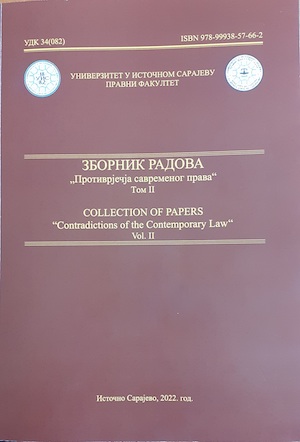Право на живот и обавеза да се проведе дјелотворна истрага
The Right to Life and Obligation to Conduct Efficient Investigation
Author(s): Miodrag N. Simović, Vladimir M. Simović
Subject(s): Law, Constitution, Jurisprudence, Human Rights and Humanitarian Law, EU-Legislation
Published by: Правни факултет Универзитета у Источном Сарајеву
Keywords: Constitution of Bosnia and Herzegovina; European Convention for the Protection of Human Rights and Fundamental Freedoms; Constitutional Court of Bosnia and Herzegovina; European Court of Human Rights;
Summary/Abstract: The right to life, protected under Article 2 of the European Convention for the Protection of Human Rights and Fundamental Freedoms, protocol No. 6 on the Abolition of the Death Penalty in Peacetime, and protocol No. 13 on the Abolition of the Death Penalty in All Circumstances, is one of the fundamental rights guaranteed under this Convention. Violation of this right is considered the most serious violation of this Convention. This right is also protected under Article II/3a of the Constitution of Bosnia and Herzegovina , and the Constitutional Court of Bosnia and Herzegovina often has the opportunity to consider appeals related to the violation of this right. The protection of the right to life exists regardless of the condition in which a person finds himself, whether he is healthy or ill, dying and without a chance to survive the situation in which he finds himself. It is realized in full form the moment of his birth until the moment of his death. In Bosnia and Herzegovina, the protection of this right lies with the prosecuting authorities: the police, the prosecution and the regular courts. In order to protect the right to life, the states which are parties to the European Convention for the Protection of Human Rights and Fundamental Freedoms are obliged to protect everyone under their jurisdiction from deprivation of life. In doing so, states are obliged to take various preventive measures to prevent the deprivation of life, and in case it does occur - they are obliged to take a number of protective measures that include material and procedural aspects. In the first part of the paper, the intention of the authors is to clarify the basic issues related to the right to life in the case law of the European Court of Human Rights. The central part brings the case law of the Constitutional Court of Bosnia and Herzegovina, as well as the analyses and discussion of the recent decision of the Constitutional Court of Bosnia and Herzegovina in the "Dragičević case" in which the appellant pointed out to violation of the right to life under Article II/3a of the Constitution of Bosnia and Herzegovina and Article 2 of the European Convention for the Protection of Human Rights and Fundamental Freedoms. The authors conclude that the competent bodies conducting the investigation must be independent of other persons who could, in any way, be related to the case, not only in hierarchical but also in practical sense. The investigation must be conducted promptly and in a timely manner and be available to the victim's family to the extent necessary to protect their rights. Moreover, in certain circumstances, the investigation must be subject to the "public eye".
Book: Зборник радова "Противрјечја савременог права" Том II
- Page Range: 373-402
- Page Count: 30
- Publication Year: 2022
- Language: Serbian
- Content File-PDF

